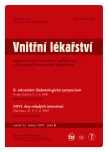-
Medical journals
- Career
Diabetes mellitus and cognitive impairments
Authors: I. Tůma
Authors‘ workplace: Psychiatrická klinika Lékařské fakulty UK a FN Hradec Králové, přednosta prof. MUDr. Jan Libiger, CSc.
Published in: Vnitř Lék 2007; 53(5): 486-488
Category:
Overview
Patients with diabetes have an at increased risk of developing cognitive impairment in comparison with the general population. Cognitive dysfunction comprises impairments of executive functions, memory, attention, and psychomotor efficiency. The question of whether recurrent exposure to severe hypoglycaemia promotes long-term cognitive dysfunction is unresolved. The main risk factors for cognitive impairment in diabetes are considered to be chronological age, duration of diabetes, and coexistent microvascular and macrovascular complications. Diabetes should be treated as a risk factor for cognitive impairment. Cognitive dysfunction is associated with poorer ability in diabetes self-care and decreased adherence to antidiabetic treatment.
Key words:
diabetes mellitus – cognition – dementia
Sources
1. Allen KV, Frier BM, Strachan MWJ. The relationship between type 2 diabetes and cognitive dysfunction: longitudinal studies and their methodological limitations. Eur J Pharmacol 2004; 490 : 169-175.
2. Brands AMA, Biessels GJ, DeHaan EHF et al. The effects of type 1 diabetes on cognitive performance. Diabetes Care 2005; 28 : 726-735.
3. Convit A. Links between cognitive impairment in insulin resistence: an explanatory model. Neurobiol Aging 2005; 26: S31-S35.
4. Debling D, Amelang M, Hasselbach P et al. Diabetes and cognitive function in a population-based study of elderly women and men. J Diabetes and Its Complications 2006; 20 : 238-245.
5. Ferguson SC, Blane A, Perros P et al. Cognitive Ability and Brain Structure in Type 1 Diabetes. Diabetes 2003; 52 : 149-156.
6. Hendrickx H, McEwen BS, Van der Ouderaa F. Metabolism, mood and cognition in aging: The importance of lifestyle and dietary intervention. Neurobiology of Aging 2005; 26: S1-S5.
7. Kumari M, Marmot M. Diabetes and cognitive function in a middle-aged cohort: findings from the Whitehall II study. Neurology 2005; 65 : 1597-1603.
8. Mc Call AL. Altered glycemia and brain-update and potential relevance to the aging brain. Neurobiol Aging 2005; 26(Suppl 1): 70-75.
9. Miles WR, Root HF. Psychologic tests applied to diabetic patients. Arch Int Med 1922; 30 : 767-777.
10. Musen G, Lyoo IK, Sparks CR et al. Effects of type 1 diabetes on gray matter density as measured by voxel-based morphometry. Diabetes 2006; 55 : 326-333.
11. Perros P, Deary IJ. Long-term effects of hypoglycaemia on cognitive function and the brain in diabetes. In: Frier BM, Fischer BM (Eds.) Hypoglycaemia in Clinical Diabetes. Chichester: Wiley 1999 : 187-210.
12. Stewart R, Liolitsa D. Type 2 diabetes mellitus, cognitive impairment and dementia. Diabet Med 1999; 16 : 93-112.
13. Tůma I. Deprese a diabetes. Vnitř Lék 2005; 51 (Suppl 2): S94-S98.
14. Wright CB, Sacco RL, Rundek TR et al. Interleukin-6 associated with cognitive function: the Northern Manhattan Study. J Stroke Cerebrovasc Dis 2006; 15 : 34-38.
Labels
Diabetology Endocrinology Internal medicine
Article was published inInternal Medicine

2007 Issue 5-
All articles in this issue
- Outline of the physiology and pathophysiology of the senses
- Olfaction and gustation in diabetes
- Diabetes mellitus and cognitive impairments
- Examination of tactile disorders in diabetic patients and cooperation with a neurologist
- Diabetic ophthalmopathy
- Pathogenesis of diabetic retinopathy
- Cataracts, glaucoma and diabetes mellitus
- Surgical treatment of diabetic retinopathy
- Pharmacological treatment of diabetic retinopathy
- Inflammatory diseases of the eye
- Thyroid orbitopathy and diabetes
- Sensorineural hearing loss in diabetes. Prosthetic care in hearing impaired patients
- Tinnitus and diabetes
- Development of opinions on physical exercise for diabetics
- Exercise therapy for patients with metabolic syndrome
- Metabolic importance of muscles and the role of sports in diabetic patients
- Nutrition for diabetics in relation to physical exertion
- Therapeutic regimes accompanying physical exercise for diabetics
- Increased activity of the sympathetic nervous system and the possibilities for therapeutic influence
- Defining the level of physical activity for a diabetic who is obese
- Physical activity centre VŠTJ MEDICINA Prague – rehabilitation for diabetics
- Rehabilitation and prosthetic care for diabetic patients after the extremity amputation
- Editorial
- Internal Medicine
- Journal archive
- Current issue
- Online only
- About the journal
Most read in this issue- Inflammatory diseases of the eye
- Tinnitus and diabetes
- Increased activity of the sympathetic nervous system and the possibilities for therapeutic influence
- Olfaction and gustation in diabetes
Login#ADS_BOTTOM_SCRIPTS#Forgotten passwordEnter the email address that you registered with. We will send you instructions on how to set a new password.
- Career

